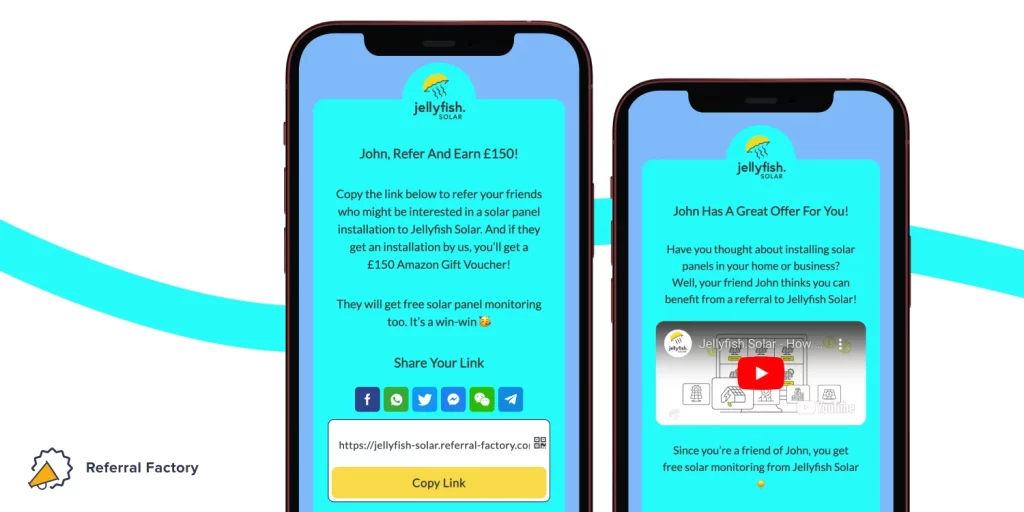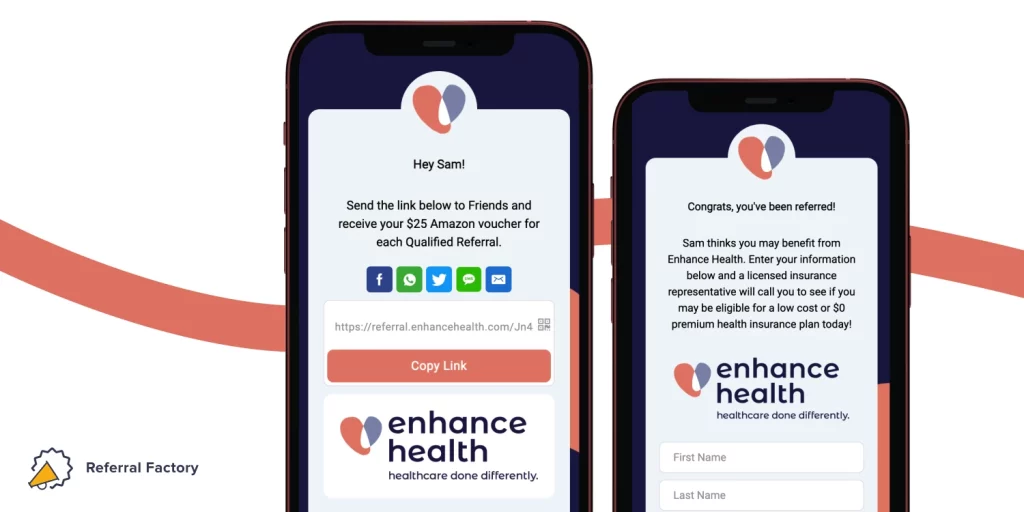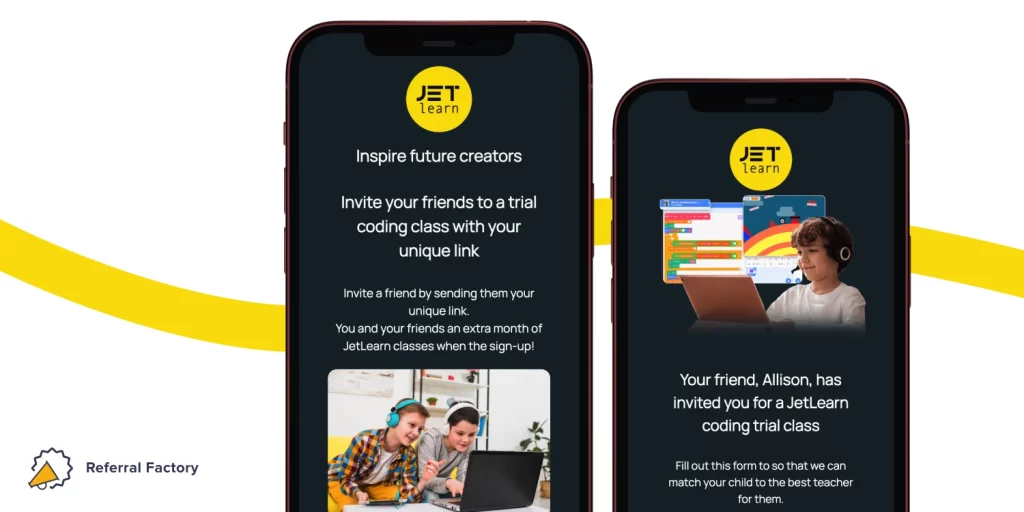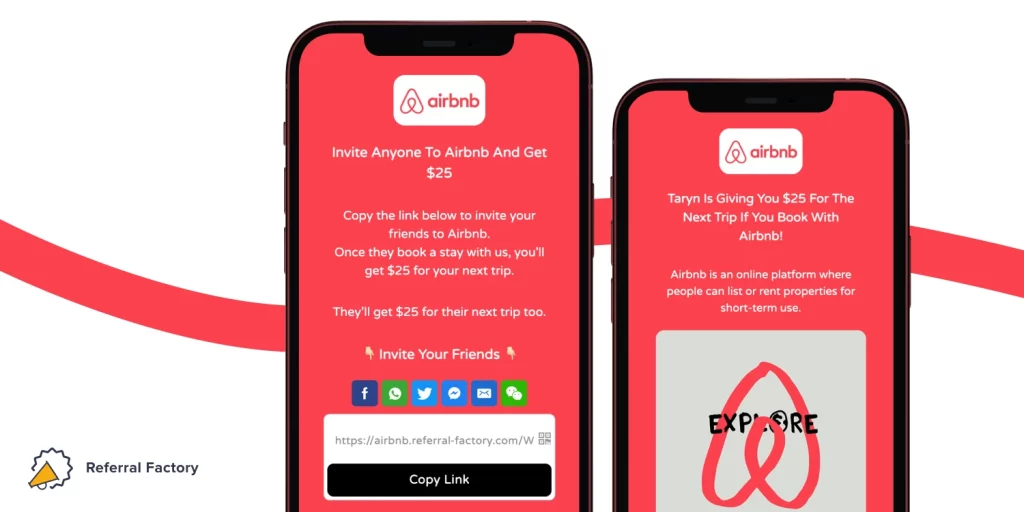What Is Referral Marketing? Everything You Need To Know
Referral marketing is when you encourage your customers and fans to refer their friends. This type of marketing typically offers rewards to people who refer new business your way.
Think of it like an exchange.
👉 They bring you a new customer.
👉 You reward them.
It’s a win-win!
Referral Marketing is growing at a staggering rate, but most marketers still don’t know what referral marketing is. We’ll do a deep dive into what referral marketing is, how you can leverage it to grow your business, and why brands are flocking to be the first in their industries to launch referral programs. You can see some real life referral program examples here or you can enter your website below and build your own one in just one click.
Table of Contents
What Is Referral Marketing?
Referral marketing, sometimes called word-of-mouth marketing, is a strategy where businesses encourage their customers to promote their products or services to friends and family. It often involves incentives like discounts, rewards, or exclusive offers to motivate existing customers to refer new ones.
If your brand is actively participating in referral marketing, then your customers would be able to share a referral link with their friends to spread the word about your business. You can read more about referral links here.
As an umbrella term, referral marketing can also include advocates or ambassadors other than existing customers, such as affiliates, employees, partners, and influencers.
What Does Referral Marketing Look Like?
Have you ever logged into Uber or Airbnb only to be prompted to refer a friend for a reward? Have you ever been asked by a service you used to tell your friends and neighbors about them?
That’s referral marketing!




In short, any business that asks you to tell your friends and family about their service is using a referral program. These programs can be used to send referrals, track those referrals, and reward referrers! The easiest way to start a referral program is to use plug-and-play referral software so you don’t have to spend a lot on developers.
You can find a list of the best referral software tools here.
What Types of Businesses Use Referral Marketing?
It really is possible for all types of business to leverage referral marketing, but some types are more likely to have success of course.
1. Online businesses like e-commerce stores and marketplaces: With the rise of social media, people are more inclined to trust the recommendations of their peers when making purchases. By implementing referral programs, these businesses can incentivize their existing customers to share positive experiences and refer their friends, leading to increased brand exposure, customer acquisition, and higher revenue.
2. Subscription-based services: Subscription-based businesses, such as streaming services, software-as-a-service (SaaS) providers, and meal kit delivery companies, can greatly benefit from referral marketing. These businesses rely on recurring revenue and long-term customer relationships, so referrals can be a powerful driver for growth. You can learn all about Saas referral programs here.
3. Local and service-based businesses: Restaurants, salons, and fitness studios, or service-based businesses like lawyers, accountants, and contractors rely heavily on word-of-mouth recommendations and personal relationships. By implementing referral programs, they can incentivize their current customers to spread the word about their exceptional services, leading to increased visibility, and trust.
4. B2B companies: In industries such as software, consulting, or professional services, trust and reputation play a crucial role. By encouraging their existing clients to refer their business to other professionals in their network, B2B companies can build credibility and drive new leads.
5. Any businesses in a niche: Human nature leads people to socialise and spend time with others who are similar to them. Moms join moms groups, fitness fans have gym buddies, medical professionals study together, and so on. If your business is in a niche, you’re in luck as referrals could be a great growth driver for you!
6. Startups and small businesses: These businesses can generate a steady stream of qualified leads without breaking the bank through referral programs, which can help startups and small businesses create buzz, increase brand awareness, and acquire new customers cost-effectively. You can learn about referral marketing for small businesses here.
7. Financial services: Financial services can use referral marketing to spread word about better rates, good loan programs, new offers and more. Financial services are a type of industry that tends to have low turnover, meaning that getting a potential customer’s friends or family to refer them is one of the best ways to get them to consider a change!
8. Professional services: Professional services can proudly show off their reviews to prove they really are the top players in their industry, but they should also be asking their customers to spread the word. This kind of endorsement is almost guaranteed to keep your business in the minds of your ideal target audience.
Referral marketing offers a refreshing and authentic approach to attracting new customers. From e-commerce and online retailers to subscription-based services, local businesses, B2B companies, startups, and small businesses, referral and word-of-mouth marketing has the potential to unlock a cost-effective and personal way to get the word out about your business.
Why Referral Marketing Matters
Referral marketing has become increasingly important in today’s competitive marketing. As the cost of advertising rises and the quality of leads generated decline, businesses are looking for new marketing channels to spur growth.
Referral marketing statistics indicate that leads generated from a referral program have a much higher conversion rate, a much lower cost to acquire, and produce customers who are ready to spend more and remain loyal. This is because they arrive after being referred by a trusted source!
Here’s why referral marketing should matter to you and your business👇
- Trust in personal recommendations: In an era of information overload and skepticism, people trust recommendations from friends, family, and peers more than ever.
- Rise of social media: Referral marketing aligns with the viral nature of social platforms, enabling businesses to reach wider audiences through organic, user-generated content.
- Saturation of online ads: Consumers are bombarded with online advertisements on the daily. Referral marketing offers a more personal and targeted approach, cutting through the noise and delivering messages directly.
- Cost-effective customer acquisition: Referral marketing often yields higher-quality leads at a lower cost compared to traditional advertising, making it an attractive option for marketers aiming to optimize their budgets.
- Customer-centric approach: Modern consumers value experiences and relationships. Referral marketing is inherently customer-centric, focusing on building positive relationships and rewarding loyalty.
- Algorithm changes in digital platforms: Referral marketing provides a more stable and controllable source of customer acquisition that isn’t prone to routine algorithm changes.
- Focus on customer experience: References are earned through positive customer experiences which aligns with today’s trend of discerning customers who do their research and trust specific sources.
- Measurable results: Referral marketing is modern, and addresses the evolving preferences of consumers, leverages digital platforms effectively, and provides a strategic advantage in fiercely competitive markets.

How Do You Do Referral Marketing?
Referral programs are intentionally designed and directed by marketers, which means that if you need to launch a referral program.
When you launch a referral program, consider the aspects of your referral marketing strategy. You can’t just ask people to spread the word then sit back and hope for the best. Your referral program should contain rewards and incentives, be easy to share, and push reminders.
As a marketer, you want to get as many people recommending your brand as possible, so you might have to change your perspective. Stop thinking of referrals as something that happens in the background and start thinking of it as a tactic. Despite having these requirements, referral marketing is much simpler than you’d think. In 2024, there are tools and platforms that make it possible to launch your own branded referral program in just a few days. The rest is pretty easy to follow:
If you do this marketing right, you’ll drive organic growth which really is the best kind of growth. By transforming customers into marketing champions who recommend your brand, you amplify your brand’s reach and resonance. Word-of-mouth marketing pushes your business in the homes, cafes, and workplaces of your customers, tapping into their trusted networks in the best way.
The best thing about customer referrals is that your existing customer base can grow exponentially. Your loyal customer refers their friends, who join your base and refer their friends, who join your base, and refer their friends… and on it goes. As your base grows so does the potential for more referrals and more visitors, leads, and conversions.
Effective Strategies for Implementing Referral Marketing
To start, if you’re working on a strategy presentation, you can download our free referral marketing strategy template here, totally gratis. Enjoy!

When it comes to implementing a referral program, there are a few key elements you should consider.
- Who are you asking to refer your business? Is it your customers, employees, influencers or a combination?
- How will you incentivize? It’s worth considering whether you’ll only reward the person doing the referring or whether you’ll also incentivize the person being referred. In customer referral programs, it’s typically best to reward both parties, what is commonly referred to as a double-sided referral program.
Once you have a clear sense of who you’ll ask to refer and what you’ll give them to motivate the referrals, your next step is to think about how to get them referring. A good bet is to use referral links. Referral links make it easy for everyone involved in the process. It also allows you to track and manage your referral program down to the very last detail.
Here’s a breakdown of the four key components of your strategy:
1. Identify Your Ideal Referrers
A successful referral marketing strategy starts with identifying who you’ll ask to refer. These can be your loyal customers, your dedicated employees, and more. By tracking their interactions with your brand and noting their level of engagement, you can build a solid list of individuals capable of championing your products or services. Remember to tailor your program according to who you’re asking. Also remember to cultivate relationships with your referrers. Providing them with the right incentives can ensure a reliable, thriving stream of high-quality referrals.
2. Design an Irresistible Referral Offer
Understand what your referrers want, then present them with an offer they can’t refuse. Keep in mind that people are often driven by the opportunity to give their friend a special deal that they can also benefit from. Creating a double-sided referral program, where both the referrer and the person being referred receive rewards, can be highly effective. Tailoring your program to reward your loyal customers not only solidifies their commitment to your brand, but also encourages them to spread the word even louder.
3. Generate Shareable Referral Links
The most effective way to implement a referral program is to use referral links. These are unique URLs that are easy to share across multiple platforms and serve as your brand’s passport to reaching potential customers. The beauty of referral links is that when they get clicked, you can include relevant information and a personalized recommendation from the referrer. This makes it super easy for the person referring as well as the new lead!
4. Track and Manage Your Incoming Referrals
Referral tracking is crucial. Referral marketing can be an amazing way to generate leads for your business, but if you don’t implement effective tracking, it can also drain your staff resources or even harm your reputation. Investing in the right tools to manage your referrals cannot be overstated. Referral marketing software that integrates into your existing systems can help you organize relationships, track referral sources, and reward referrals promptly and accurately.
Winning strategies for managing referrals also involve recalibration and adjustment. For boosted growth, evaluate benchmarks, manage referral sources diligently, and adapt your approach based on tangible results.
Conclusion
As long as humans continue to seek out social hubs, referral marketing will be one of the most effective types of marketing. It leverages the customers who love your service or product to attract even more potential fans at enviable prices, and the simple truth is that referral marketing has been around for as long as marketing. Today it’s easier than ever to get started with this refined form of word-of-mouth advertising.
So are you ready to throw out your existing channels and go all in on referral marketing? Check out our YouTube channel for more content around referral marketing and you can use it to grow 🚀




